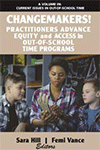
Changemakers!
Practitioners Advance Equity and Access in Out-of-School Time Programs
Edited by:
Sara Hill
Femi Vance
A volume in the series: Current Issues in Out-of-School Time. Editor(s): Helen Janc Malone, Institute for Educational Leadership.
Published 2019
A foundational tenet of the Out-of-School Time (OST) field is that all youth deserve impactful and engaging learning experiences. That requires that organizations, programs, and OST professionals remain responsive to the emerging needs of their diverse youth populations and the communities in which they live. This book illustrates the tensions that arise when organizations and OST professionals try to engage all youth, especially the traditionally underserved populations — when infrastructure, funding, and mindsets have not kept pace with the evolving needs of youth and their communities. The issues raised in this book — funding, outreach, engagement of immigrant families — have yet to be fully explored with an equity lens. Within these broad topics, this book brings to the surface the equity and access challenges as well as posit solutions and strategies.
Each chapter is written from an insider’s perspective, by practitioners themselves, who articulate some of the key and relevant issues in the field. Each chapter ends with a Research-Practice Connection section written by the editors, which discusses the topic from a research lens and generates a set of questions that can be used by researchers in future studies to explore the topic in a more in-depth, expansive manner.
Book reviews and associated articles:
Afterschool Matters: Practitioners Advance Equity and Access
Learning in Afterschool & Summer: Equity and Access in OST Programs
CONTENTS
Access in Out-of-School Time Programs, Sarah Zeller-Berkman. PART I: INTRODUCTION. Introduction, Sara Hill and Femi Vance. PART II: SHAPING ORGANIZATIONS FOR ACCESS AND EQUITY. Putting Our Minds to It: Implicit Bias and Advancing Equity in Youth Development, Kathryn Sharpe. On the Level: Local Networks Creating Deeper and More Equitable School-Community Partnerships, Ken Anthony. Extending a Mighty Hand: Outreach and Retention Strategies to Help Our Least Supported Youth, Rachel Loeper. Rooted in Scarcity and Deficit: Time to Reconsider the Funding Process, Rebecca Fabiano. What Does it Take to Provide Disabled Youth Access to Out-of-School Time Programs? Suzanne Stolz. PART III: EQUITY THROUGH CRITICAL PRACTICE. Critical Youth Development: Living and Learning at the Intersections of Life, Merle McGee. Maintaining Momentum to Empower Boys and Young Men of Color in the Out-of- School-Time Field, Jon Gilgoff. Engaging Immigrant Families in Out-of-School Time Activities, Andrés Henríquez and Sonia Bueno. PART IV: SUMMARY AND CONCLUSION. Summary and Conclusion, Sara Hill and Femi Vance. Biographies.
REVIEWS
"Changemakers! Practitioners Advance Equity and Access in Out-of-School Time Programs, edited by Sara Hill and Femi Vance (Information Age) provides a thorough (and long overdue) examination of youth development policy and practice in the context of White supremacy, systemic oppression, and other forms of inequity. It offers a valuable introduction for those new to the field and for veterans just now starting to consider more equitable approaches to their work." April Riordan April Riordan in Journal of Youth Development (Read full review)
-
Paperback978-1-64113-620-4
Web price: $35.18 (Reg. 41.39)
-
Hardcover978-1-64113-621-1
Web price: $68.42 (Reg. 80.49)
- eBook978-1-64113-622-8

- EDU038000 - EDUCATION: Student Life & Student Affairs
- EDU051000 - EDUCATION: Learning Styles
- EDU014000 - EDUCATION: COUNSELING: Academic Development
-
 At Our Best
Building Youth-Adult Partnerships in Out-of-School Time Settings
At Our Best
Building Youth-Adult Partnerships in Out-of-School Time Settings
-
 It Takes an Ecosystem
Understanding the People, Places, and Possibilities of Learning and Development Across Settings
It Takes an Ecosystem
Understanding the People, Places, and Possibilities of Learning and Development Across Settings
-
 Measure, Use, Improve!
Data Use in Out-of-School Time
Measure, Use, Improve!
Data Use in Out-of-School Time
-
 Social and Emotional Learning in Out-Of-School Time
Foundations and Futures
Social and Emotional Learning in Out-Of-School Time
Foundations and Futures
-
 Special Education During the Pandemic
Considerations for Change in Practice
Special Education During the Pandemic
Considerations for Change in Practice
-
 The Growing Out-of-School Time Field
Past, Present, and Future
The Growing Out-of-School Time Field
Past, Present, and Future
-
 The Heartbeat of the Youth Development Field
Professional Journeys of Growth, Connection, and Transformation
The Heartbeat of the Youth Development Field
Professional Journeys of Growth, Connection, and Transformation

